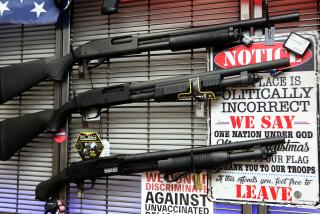White House to Seek Gun Dealer Fee of $600
- Share via
WASHINGTON — Aiming to reduce the number of gun dealers in the nation by 80%, the Clinton Administration today will propose hiking annual licensing fees to $600, nearly 10 times higher than the level under the recently enacted Brady bill gun control legislation.
The plan is one of several weapon control measures that Treasury Secretary Lloyd Bentsen will propose in keeping with President Clinton’s pledge to push for steps beyond those in the Brady bill and in the anti-crime legislation approved by both houses of Congress and now awaiting action by House-Senate conferees.
Since 1968, dealers have paid $30 for a three-year license. The license allows the holder to purchase weapons at wholesale, to avoid state and local taxes, and to ship guns across state lines.
The Brady bill, which also imposes a five-day waiting period for handgun purchases, raised the three-year fee to $200 for new applicants, with a $90 renewal fee. The bill was named for James S. Brady, President Ronald Reagan’s press secretary who was severely wounded in the March, 1981, attempt to assassinate Reagan.
In recent months, the White House as well as many former congressional opponents of gun control have recognized that the views of many Americans have changed in the face of mounting violence.
Congress and the Administration seized on the new mood and pressed for tougher language in the anti-crime legislation than was thought possible earlier in the year. The legislation includes provisions to build more prisons, stiffen sentences for gun-wielding criminals, hire 100,000 more police officers for the nation’s streets and ban the manufacture, sale or possession of assault weapons.
The theory behind the sharp increase in license fees is that only 20% of the more than 284,000 gun dealers nationwide are genuinely engaged in the sale of firearms.
Others buy licenses only to help them obtain weapons for their own use at lower costs. They have no intention of selling weapons as retailers, Treasury Department officials said. As a result, federal inspectors have greater difficulty policing the industry.
Bentsen, who is becoming the Administration’s point man on stiffer gun controls, will announce the initiatives in a speech at an awards ceremony at the Federal Law Enforcement Training Center. He also is expected to call for requiring a federal permit for the purchase of explosives, to make the theft of explosives a felony and to outlaw the purchase of explosives by convicted felons. Federal permits are required now only if the explosives cross state lines.
A Treasury official, who declined to be named, insisted that the $600 license fee “is only the cost of administering the licensing program.”
The Treasury official cited a survey conducted last year which found that 70% of the license holders did not own stores and that an overwhelming number were not buying and selling enough firearms to meet the statutory definition of a dealer.
Many of those surveyed by Treasury’s Bureau of Alcohol, Tobacco and Firearms had no guns in their inventory for the previous year.
Those circumstances exist largely because the agency’s 240 inspectors do not provide enough manpower to police the licensees. The proliferation of license holders also has resulted in shoddy record keeping, thwarting attempts by authorities to trace firearms, according to the officials.
A National Rifle Assn. lobbyist, however, contended that the proposed higher fee is “entirely unjustified” and amounts to about five times the cost of processing the license.
“What Secretary Bentsen is doing is just another example of attempting to recover the cost of criminal investigations by jacking up the price the law-abiding firearms dealers have to pay,” the lobbyist, Joe Phillips, told the Associated Press.
Bentsen’s proposal faces difficulty in Congress, an aide to a leading House Democrat said. “It’s going to be uphill because the gun lobby hates it, but maybe it will be easier than it has been in past years.”
A senior Treasury Department official said the Administration believes that “the time is ripe” for enactment of the higher fees and related measures, citing the decision by leading retailers, such as Wal-Mart, to curtail their firearms business.
“We think the country’s mood is changing,” the official said.
Bentsen also will announce steps to increase the number of ATF firearms dealer inspectors and to enhance the bureau’s computer record-keeping to make tracing easier, an official said.
Under Bentsen’s proposals, the ATF also would be given stronger authority to require dealers to comply with licensing requirements and to share information on firearms with state and local police.
Times staff writer William J. Eaton contributed to this story.
More to Read
Sign up for Essential California
The most important California stories and recommendations in your inbox every morning.
You may occasionally receive promotional content from the Los Angeles Times.













